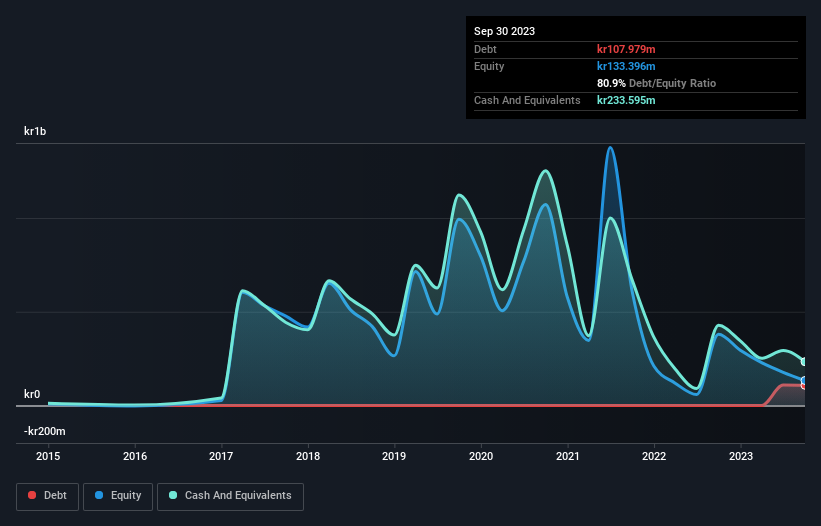Oncopeptides (STO:ONCO) Has Debt But No Earnings; Should You Worry?
The external fund manager backed by Berkshire Hathaway's Charlie Munger, Li Lu, makes no bones about it when he says 'The biggest investment risk is not the volatility of prices, but whether you will suffer a permanent loss of capital.' So it seems the smart money knows that debt - which is usually involved in bankruptcies - is a very important factor, when you assess how risky a company is. We can see that Oncopeptides AB (publ) (STO:ONCO) does use debt in its business. But is this debt a concern to shareholders?
When Is Debt A Problem?
Generally speaking, debt only becomes a real problem when a company can't easily pay it off, either by raising capital or with its own cash flow. In the worst case scenario, a company can go bankrupt if it cannot pay its creditors. However, a more usual (but still expensive) situation is where a company must dilute shareholders at a cheap share price simply to get debt under control. Of course, plenty of companies use debt to fund growth, without any negative consequences. The first thing to do when considering how much debt a business uses is to look at its cash and debt together.
See our latest analysis for Oncopeptides
What Is Oncopeptides's Net Debt?
You can click the graphic below for the historical numbers, but it shows that as of September 2023 Oncopeptides had kr108.0m of debt, an increase on none, over one year. However, it does have kr233.6m in cash offsetting this, leading to net cash of kr125.6m.

A Look At Oncopeptides' Liabilities
The latest balance sheet data shows that Oncopeptides had liabilities of kr41.8m due within a year, and liabilities of kr119.8m falling due after that. On the other hand, it had cash of kr233.6m and kr43.3m worth of receivables due within a year. So it actually has kr115.3m more liquid assets than total liabilities.
This surplus suggests that Oncopeptides is using debt in a way that is appears to be both safe and conservative. Due to its strong net asset position, it is not likely to face issues with its lenders. Simply put, the fact that Oncopeptides has more cash than debt is arguably a good indication that it can manage its debt safely. The balance sheet is clearly the area to focus on when you are analysing debt. But ultimately the future profitability of the business will decide if Oncopeptides can strengthen its balance sheet over time. So if you're focused on the future you can check out this free report showing analyst profit forecasts.
While it hasn't made a profit, at least Oncopeptides booked its first revenue as a publicly listed company, in the last twelve months.
So How Risky Is Oncopeptides?
Statistically speaking companies that lose money are riskier than those that make money. And in the last year Oncopeptides had an earnings before interest and tax (EBIT) loss, truth be told. And over the same period it saw negative free cash outflow of kr304m and booked a kr259m accounting loss. Given it only has net cash of kr125.6m, the company may need to raise more capital if it doesn't reach break-even soon. Even though its balance sheet seems sufficiently liquid, debt always makes us a little nervous if a company doesn't produce free cash flow regularly. There's no doubt that we learn most about debt from the balance sheet. However, not all investment risk resides within the balance sheet - far from it. Case in point: We've spotted 5 warning signs for Oncopeptides you should be aware of.
When all is said and done, sometimes its easier to focus on companies that don't even need debt. Readers can access a list of growth stocks with zero net debt 100% free, right now.
New: AI Stock Screener & Alerts
Our new AI Stock Screener scans the market every day to uncover opportunities.
• Dividend Powerhouses (3%+ Yield)
• Undervalued Small Caps with Insider Buying
• High growth Tech and AI Companies
Or build your own from over 50 metrics.
Have feedback on this article? Concerned about the content? Get in touch with us directly. Alternatively, email editorial-team (at) simplywallst.com.
This article by Simply Wall St is general in nature. We provide commentary based on historical data and analyst forecasts only using an unbiased methodology and our articles are not intended to be financial advice. It does not constitute a recommendation to buy or sell any stock, and does not take account of your objectives, or your financial situation. We aim to bring you long-term focused analysis driven by fundamental data. Note that our analysis may not factor in the latest price-sensitive company announcements or qualitative material. Simply Wall St has no position in any stocks mentioned.
About OM:ONCO
Oncopeptides
A biotech company, engages in the research, development, and commercialization of targeted therapies for difficult-to-treat hematological diseases in the United States, Europe, and internationally.
High growth potential with mediocre balance sheet.
Similar Companies
Market Insights
Weekly Picks

Solutions by stc: 34% Upside in Saudi's Digital Transformation Leader


The AI Infrastructure Giant Grows Into Its Valuation
Recently Updated Narratives
Many trends acting at the same time


Engineered for Stability. Positioned for Growth.


Staggered by dilution; positions for growth
Popular Narratives


MicroVision will explode future revenue by 380.37% with a vision towards success


NVDA: Expanding AI Demand Will Drive Major Data Center Investments Through 2026



